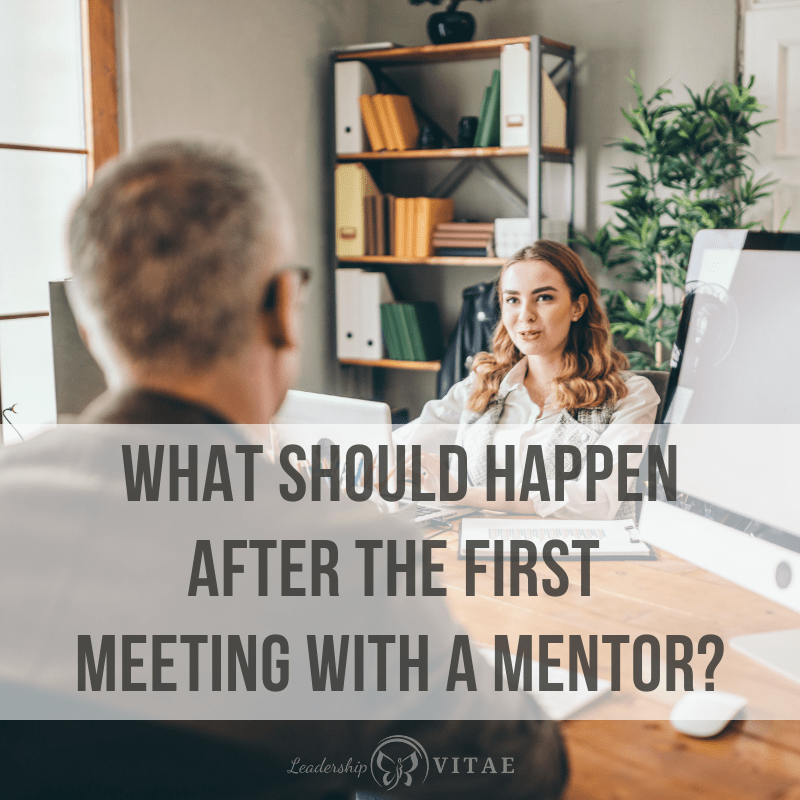
Mentoring is a wonderful way to give back – sharing our knowledge with others – as well as opening us to new ways of thinking. And while there is a lot of information out there about mentors, sometimes it can feel incomplete.
In a recent discussion with one of my mentees, she pointed out a gap that I hoped to help her fill. She’s part of a cohort, and every one of her peers has a mentor. They all struggled with the same thing.
How to prepare after the first meeting.
There is a lot of advice out there about how to cultivate relationships with mentors and sponsors. Who to look for, how to reach out, and how to prepare for the first meeting. But what about the second?
My mentee and I follow a general approach, but I wanted to provide her with something she could share with her peers. Looking online, I struggled to find what I was looking for. Knowledge gaps are an opportunity to share insights, so here goes.
First mentor meeting preparation and actions
All mentoring engagements start out similarly. We’re all taught to prepare ahead of that first discussion.
First, what are our goals? We should know what we’re looking to achieve (even if it’s getting clarity on our goals). It can be overall in our careers (long-term), our next move (mid-term), or the goal for the meeting with the mentor (now).
Next, how might the mentor assist us? Where are we struggling and could use some insight? Are we hitting roadblocks?
At the end of the first meeting, we will ideally have some insights and actions to move us forward. After the meeting, best practice would include three actions:
- Thank the mentor for their time, potentially reflecting on a key insight or action.
- Update the mentor if their advice bore fruit. Give them the gift of knowing how they helped.
- Ask for a follow-up if the meeting went well and we’d like to further cultivate a relationship with this mentor.
Preparing for follow-up mentor meetings
Establishing expectations for the first meeting is important, because we need to build on those to prepare for the next meeting. Key preparation steps include:
- Where am I now? What has changed since the last meeting? What have I learned? What new challenges am I facing?
- Updated goals. Am I still pursuing the same outcome?
- How am I progressing with the action items and insights from the last meeting?
- Where am I struggling or needing help, either with my goal, current situation, or action items?
My mentee and I have regular meetings as part of our mentoring program. In each session, we start with where she is now, because that anchors the conversation in her current reality. Depending on the current state, that may shift goals, action items, and/or whatever assistance I might provide.
Ideally, a mentee builds on the outcomes of each meeting to prepare for the next. Considers what is true now and what may have changed since the last meeting. If goals have changed, action items are no longer relevant, or there is a new need, that information would be important to share with a mentor. Otherwise, he or she may still be operating from the original goals and desired outcomes.
For all the mentors out there
While it would be wonderful if every mentee was prepared going into follow-up discussions with their mentors, that might not be an easy task. If there’s not a lot of guidance out there on how to prepare, we can help our mentees by letting them know what success looks like from our perspective.
It’s also important that we prepare. Having notes on a mentee can be helpful to refresh our memories ahead of a meeting. It doesn’t have to be much. Maybe key goals, actions, and commitments for the next meeting. I check my notes ahead of a meeting so I’m anchored in what we discussed last.
Once our memories are refreshed, we can put the old away. Because what happened last week or last month is history. Each meeting is an opportunity to let the mentee lead, starting with where they are today. We can keep their overall goal in mind, but loosely held. Allowing for any adjustments that may have happened since the last meeting.
During the discussion, consider what may be standing in their way that we can help bring light to. Not solutions, but clarity. Providing the space for them to ideate, solve, or ask for insight to barriers and obstacles.
By hearing the mentee’s ideas first, it builds confidence in their problem-solving skills and using their voice. Even if we know something they may not, it doesn’t have to be shared. Will it be detrimental to them if we don’t? Will sharing it preclude them from their own growth and discovery? It’s a delicate balance.
Successful discussions mix preparation and flexibility
No matter which side of the mentoring table we’re sitting on, we can both prepare and remain flexible for the best outcomes.
Our work and home lives will change over time, and our goals and target outcomes should as well. Staying aligned on the mentee’s current state and goals, while remaining open to detours and course corrections, allows both parties to co-create a map for the mentee. One where we know the next milestones or destination, as well as where the mentee is at present. It’s the “YOU ARE HERE” spot on any useful map.
Ultimately, the mentee is in the driver’s seat. Mentors are there to help with signposts, warning signs, encouragement, and support. And sometimes, to learn a new path through familiar territory so we can update our own maps as well.
* * *
Have you had a long-standing relationship with a mentor? What other suggestions do you have for preparing for follow-up meetings as your relationship progresses? Please share your thoughts in the comments.








